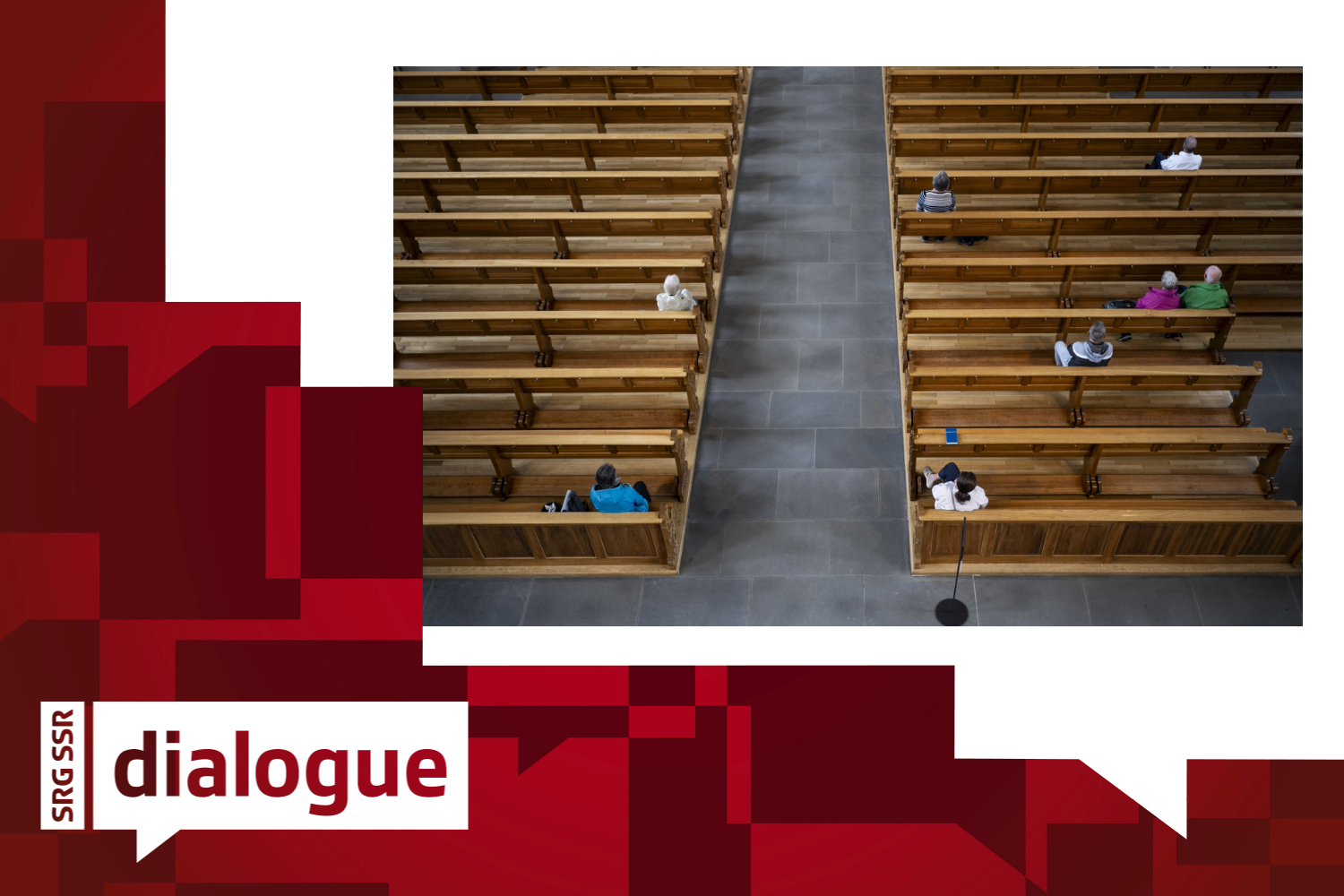
Poll finds over half of Swiss residents don’t believe in God

The number of people turning their backs on organised religion in Switzerland has been growing for years. A new survey reveals how little importance religion holds for the Swiss population today. More than half of those surveyed say they do not believe in God.
For years, Swiss churches have been losing worshippers, and last year was no exception. This may have been influenced by the numerous sexual abuse cases which were made public and have damaged the reputation of religious institutions.
According to the data publishedExternal link on Thursday by the Swiss Pastoral Sociological Institute (SPI), the Catholic Church in Switzerland experienced the largest exodus of believers in 2023: 67,497 people abandoned the church compared to 34,561 in 2022. The Catholic Church is not alone. In 2023, a record number of people (39,233) left the Protestant Reformed Church (30,102 people left in 2022).
The results of the second edition of the survey “How are you, Switzerland?”, commissioned by the Swiss Broadcasting Corporation (SBC), SWI swissinfo’s parent company, confirm that traditional religions only play a minor role for the majority of the population. For the first time, questions were asked on the subject of faith. Less than a third of respondents said they strongly believe in God, while over half said they did not believe in God at all.
Meanwhile, three out of four respondents said they strongly believed in science. Belief in God and science are not fundamentally mutually exclusive. However, they are two opposing concepts to explain existential questions.
When asked whether they believed in extraterrestrial life, only one in four people answered with a definite “yes”, even though science itself considers it highly probable and UFOs continue to exert a great fascination.
The results of the “How are you, Switzerland?” poll are based on a representative survey of 51,182 Swiss residents and Swiss Abroad. It was conducted by the gfs.bern research institute in May and June 2024 on behalf of the SBC. This is the second time this survey has been carried out. Compared to the previous year’s version, some of the questions were new or different, but most were identical.
In all, 3,000 respondents were selected from a online panel by gfs.bern in order to obtain a representative sample of the Swiss population (16 years and older). The sample was stratified according to language region and proportioned according to age and gender.
The other respondents completed the questionnaire online. They were invited to do so via the SBC channels, but decided for themselves whether or not they wanted to participate. This survey method is not representative. Representativeness is achieved by means of specific data weighting and data validation procedures. The questionnaire consisted of around 300 questions. To ensure that an interview did not exceed approx. 20 minutes, gfs.bern did not ask the same questions to all respondents. The sampling error is +/- 1.8 % at 50:50 and 95 % probability.
Belief in science is strong but not uniform. Two factors influence this trust: age and education level. Younger people show greater trust in science and this decreases with age. Also, the higher the level of education, the stronger the belief in science.
The age of the people surveyed also has an influence on how strong they believe in God. Older generations profess it more strongly than younger ones. There are also clear differences between the language regions: French-speakers believe the least in God, followed by respondents from German-speaking Switzerland, then Italian- and Romansh-speakers.
Open for other beliefs
Just under 40% of respondents said they strongly believe in a higher power, while roughly the same percentage said they do not believe in a higher power at all.
In answer to a question whether they believe in some form of spirituality, respondents were more favourable than when they were asked about their belief in God. This suggests that the population is more open to less traditional or institutionalised forms of faith.
The low significance that people attach to religion was also confirmed by the fact that only one out of four respondents agree that belonging to a national confession is more or less important for Switzerland’s national identity. Four out of five people said they somewhat or completely disagree with the statement that Switzerland would be better off if people were more religious.
Adaptation from German: Claire Micallef/sb

In compliance with the JTI standards
More: SWI swissinfo.ch certified by the Journalism Trust Initiative






























You can find an overview of ongoing debates with our journalists here . Please join us!
If you want to start a conversation about a topic raised in this article or want to report factual errors, email us at english@swissinfo.ch.